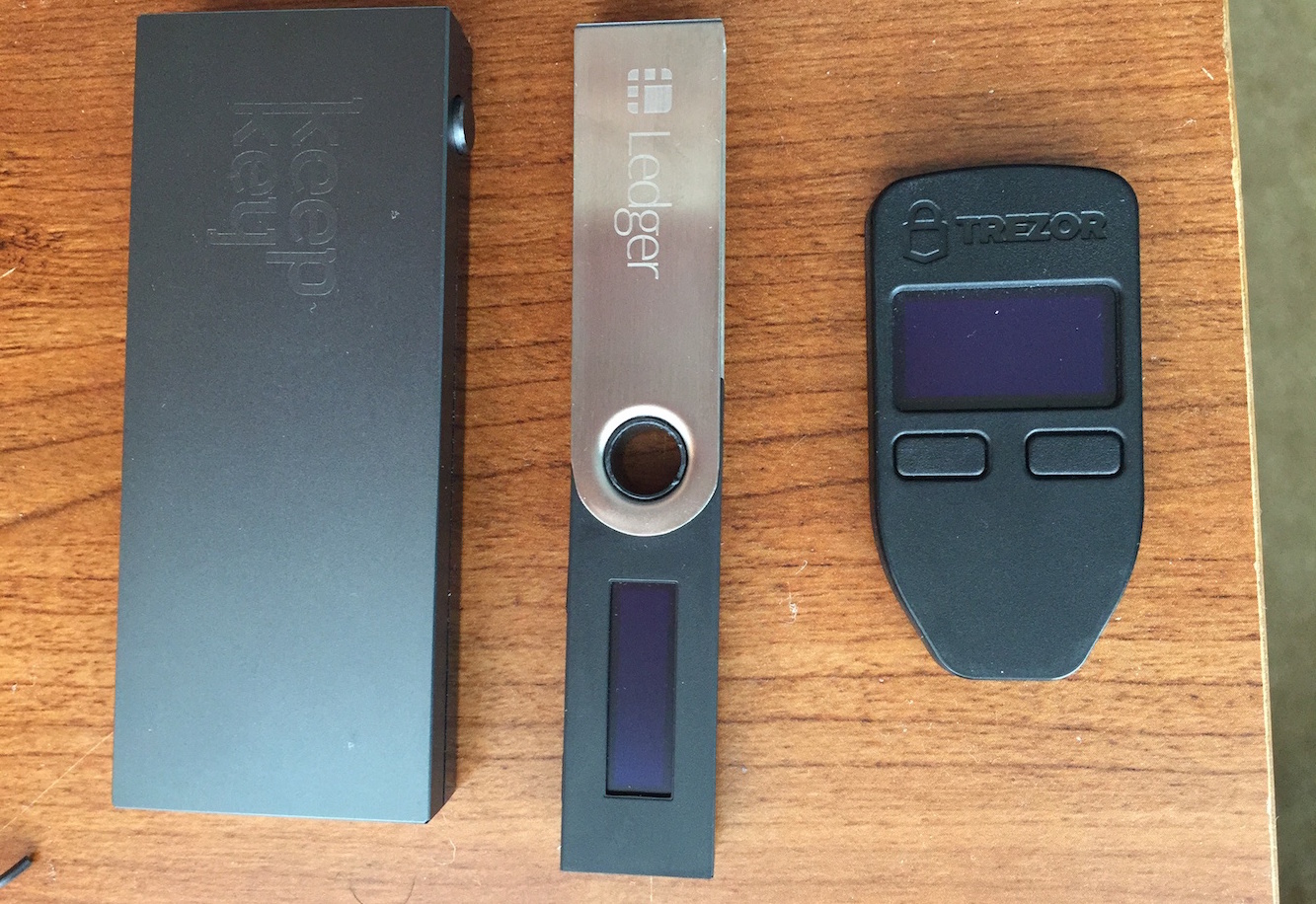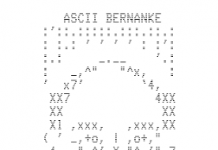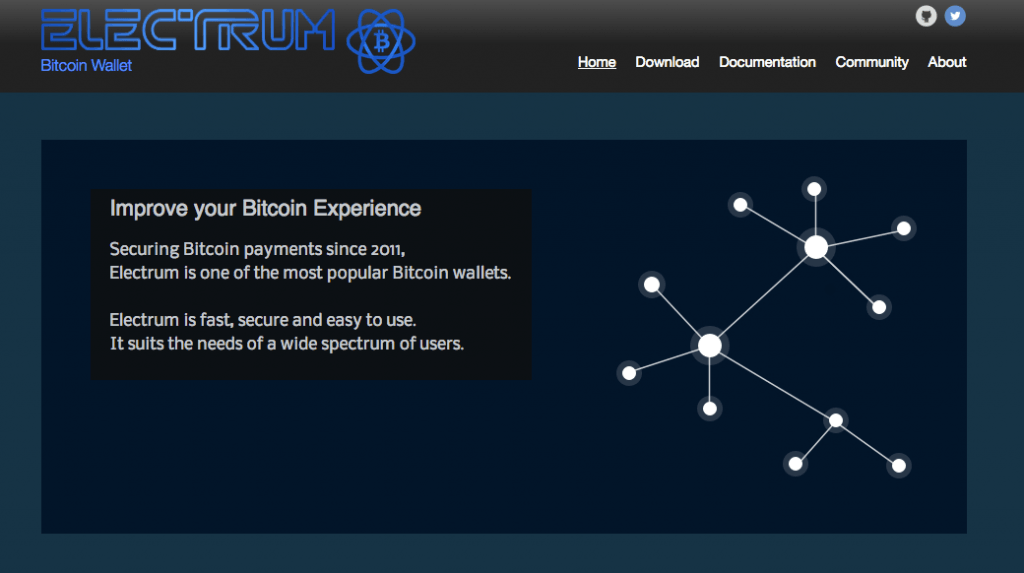CHAPTER 1: What is a Bitcoin Wallet?
 A Bitcoin wallet is the first step to using Bitcoin.
A Bitcoin wallet is the first step to using Bitcoin.
Why?
Without a wallet, you can’t receive, store, or spend bitcoins.
You can think of a wallet as your personal interface to the Bitcoin network, similar to how your online bank account is an interface to the regular monetary system.
Bitcoin wallets contain private keys; secret codes that allow you to spend your bitcoins.
In reality, it’s not bitcoins that need to be stored and secured, but the private keys that give you access to them.
In short:
A Bitcoin wallet is simply an app, website, or device that manages Bitcoin private keys for you.
CHAPTER 2: Types of Bitcoin Wallets
Let’s discuss the types of bitcoin wallets and why you might want to use one kind over another.
Hardware Wallets
 The Ledger Nano S is one example of a hardware wallet.
The Ledger Nano S is one example of a hardware wallet.A hardware wallet is a physical electronic device, built for the sole purpose of securing bitcoins.
The core innovation is that the hardware wallet must be connected to your computer, phone, or tablet before bitcoins may be spent.
The three most popular and best Bitcoin hardware wallets are:
Hardware wallets are a good choice if you’re serious about security and convenient, reliable Bitcoin storage.
Bitcoin hardware wallets keep private keys separate from vulnerable, internet-connected devices.
Your all-important private keys are maintained in a secure offline environment on the hardware wallet, fully protected even should the device be plugged into a malware-infected computer.
As bitcoins are digital, cyber-criminals could, potentially, target your computer’s “software wallet” and steal them by accessing your private key.
Generating and storing private keys offline using a hardware wallet ensures that hackers have no way to reach your bitcoins.
Hackers would have to steal the hardware wallet itself, but even then, it can be protected with a PIN code.
Don’t worry about your hardware wallet getting stolen, lost or damaged either; so long as you create a secret backup code, you can always retrieve your bitcoins.
Think of a hardware wallet like your own underground steel vault. If you own a significant amount of bitcoins, you should strongly consider getting one!
Why are hardware wallets good?
- Easiest way to securely store bitcoins
- Easy to backup and secure
- Less margin for error; setup is easy even for less technical users
Why are hardware wallets bad?
- They’re not free!
Hot Wallets
Hot wallets are Bitcoin wallets that run on internet connected devices like a computer, mobile phone, or tablet.
Private keys are secret codes. Because hot wallets generate your private keys on an internet connected device, these private keys can’t be considered 100% secure.
Think of a hot wallet like your wallet today: you use it to store some cash, but not your life savings. Hot wallets are great if you make frequent payments, but not a good choice for the secure storage of bitcoins.
Why are hot wallets good?
- Easiest way to store small amounts of bitcoin
- Convenient; spending and receiving payments is easy and fast
- Some hot wallets allow access to funds across multiple devices
Why are hot wallets bad?
- Not safe for the secure storage of large amounts of bitcoins
Which Wallet is Best for You?
Investing or saving? Then a hardware wallet will keep your coins safe.
Otherwise, a software wallet will send and receive bitcoins just fine. Best of all, software wallets are free.
Each wallet has pros and cons, and different wallets are built to solve different problems.
Some wallets may be geared towards security, while some wallets may be more focused on privacy.
Your specific needs should determine the wallet you use, as there is no “best bitcoin wallet”.
Below, we’ve listed wallets you can buy or download. We suggest using the wallets listed or doing research before buying or downloading any wallet.Each day, new Bitcoin scam wallets are added to the Google Play Store and Apple app store that are designed to steal peoples’ bitcoins.
We only list wallets that have published and open-sourced their code.
CHAPTER 3: Hardware Wallets: Keep Your Coins Safe
Hardware wallets aren’t free.
 The three most popular hardware wallets: KeepKey, Ledger Nano S, and Trezor.
The three most popular hardware wallets: KeepKey, Ledger Nano S, and Trezor.But the price can be worth it if you own a significant amount of bitcoins. A hardware wallet will protect a few hundred in Bitcoin just as effectively as a few million.
How Hardware Wallets Work
Hardware wallets are secure, offline devices. They store your private keys offline so they can’t be hacked.
This means you can even use one on a malware infected computer.
Why A Hardware Wallet with a Screen is Important
In the table below, you’ll notice we show which hardware wallets have screens.
Screens provide extra security by verifying and displaying important wallet details. Since the hardware wallet is nearly impossible to hack, its screen is more trustworthy than data displayed on your computer.
Bitcoin Hardware Wallet Comparison
Check the table below for a quick comparison. Note:
We also did a detailed comparison of the three main ones: Ledger Nano S, Trezor, and KeepKey.
CHAPTER 4: Hot Wallets
Just a quick refresher:
Hot wallets are Bitcoin wallets that run on internet connected devices like a computer, mobile phone, or tablet. As hot wallets generate private keys on an internet connected device, these private keys can’t be considered 100% secure.
Think of a hot wallet like your wallet today: you use it to store some cash, but not your life savings. Hot wallets are great if you make frequent payments, but not a good choice for the secure storage of bitcoins.
Online Bitcoin Wallets (Web Wallets)
Web wallets store your private keys online, where they are encrypted with a user-selected password. Although they offer the lowest level of security, online bitcoin wallets have the advantage of being accessible from any internet connected device.
GreenAddress
GreenAddress is a multi-signature Bitcoin wallet available on the web, desktop, Android, and iOS. GreenAddress is compatible with hardware wallets like TREZOR, Ledger Nano, and the HW.1.
“Multi-signature” in this context means that the site requires a manual confirmation from you for your coins to be moved; this greatly improves security.
Android Bitcoin Wallets
There is a large selection of Android wallets. Since Bitcoin wallets were originally banned by Apple, developers spent much of their time developing for Android.
 Mycelium
Mycelium
Mycelium is the most popular Bitcoin wallet on Android. It’s very easy to use for sending and receiving payments. Backing up your wallet is also simple, since Mycelium makes it very clear with setup and backup instructions.
 breadwallet
breadwallet
breadwallet, the great iPhone Bitcoin wallet, recently released an Android wallet. It offers the user control of private keys, an easy to use interface, and passcode support.
 Airbitz
Airbitz
Airbitz is an easy to use Bitcoin wallet for iPhone and Android. Its familiar login feature makes using the app a breeze for people new to bitcoin. The wallet also creates automatic backups, so you don’t have to worry about the technicalities of performing manual wallet backups.
 GreenBits
GreenBits
GreenBits is the native Android version of GreenAddress. It’s a multi-signature wallet that also supports hardware wallets like TREZOR and Ledger.
 Bitcoin Wallet
Bitcoin Wallet
Bitcoin Wallet, or “Schildbach Wallet”, was the first mobile Bitcoin wallet. Bitcoin Wallet is more secure than most mobile Bitcoin wallets, because it connects directly to the Bitcoin network. Bitcoin Wallet has a simple interface and just the right amount of features, making it a great wallet and a great educational tool for Bitcoin beginners.
iOS and iPhone Bitcoin Wallets
Apple banned Bitcoin wallets from the App Store in February 2014, but reversed its decision a few months later. Luckily, there are now plenty of options for iOS users.
 breadwallet
breadwallet
We consider breadwallet, along with Copay (below), as the best bitcoin wallet for iPhone. It’s open source and gives the user full control over their private keys. It also has a clean interface which makes the sending and receiving of bitcoins a pleasurable and super-simple process.
 Airbitz
Airbitz
Airbitz is an easy to use Bitcoin wallet for iPhone and Android. Its familiar login feature makes using the app a breeze for people new to bitcoin. The wallet also creates automatic backups, so you don’t have to worry about the technicalities of performing manual wallet backups.
Desktop Wallets
 Electrum
Electrum
Electrum is a light weight Bitcoin wallet for Mac, Linux, and Windows. Electrum was created in November 2011. The main features of Electrum are: support for hardware wallets (such as TREZOR, Ledger Nano and KeepKey), and secure Bitcoin storage using an offline computer. Electrum is a good option for both beginners and advanced users.
CHAPTER 5: Bitcoin Banks: $1 Billion Lost in Hacks
One last thing to keep in mind when it comes to bitcoin wallets is that there is a difference between a wallet and a bank. Some Bitcoin users view Coinbase as a Bitcoin wallet, but companies like this operate much more like banks.
Remember:
The private keys are what users need to protect to safely use the Bitcoin network without getting robbed. When you hand someone else control over your private keys, you are essentially making a deposit at that financial institution – much like a deposit at any bank.
Don’t store coins on exchanges! Bitcoin users have lost over $1 billion worth of bitcoins in exchange hacks and scams. Control your own private keys.
Understanding how bitcoin wallets work is an important aspect of safely using this new technology. Bitcoin is still in its early years of development and wallets will become much more user-friendly in time.
In the near future, certain devices may eventually come with pre-installed wallets that interact with the blockchain without the user’s knowledge.
For now, it’s vital to keep in mind that the private keys are what you need to protect if you want to keep your bitcoin safe from hackers, user error, and other possible issues.
CHAPTER 6: Theft and Scams
No matter which wallet you choose, remember:
Your bitcoins are only safe if the private key was generated securely, remains a secret, and–most importantly–is controlled only by YOU!
Here are two examples where users got ripped off by leaving bitcoins in the care of a third party:
- The Bitfinex hack, in which users lost $70 million
- The failure of Mt Gox, in which users lost $450 million or more
To avoid theft, scams, and any other loss of funds, follow these three basic principles:
- Generate your private keys in a secure, offline environment. (Except if using trivial amounts, in which cases keys may be created in a hot wallet).
- Create backups of your private keys. This helps to protect against the loss of your bitcoins due to hard drive failure or some other problem or accident. Ideally you should have a duplicate set of backups kept off-site to protect against the possibility of fire, robbery, etc.
- Encrypt wallets to provide additional security. This helps prevent the physical theft of your funds in the event that your device or hardware wallet is stolen.
Securing your bitcoins properly is the most important step for any Bitcoin user.
With Bitcoin you have the privilege – but also the responsibility – to safeguard your own money. There have been countless scams related to Bitcoin that could have been prevented had people not entrusted others with their bitcoins.
It’s a good rule of thumb to never trust anyone else with your money.
BONUS CHAPTER: Bitcoin Wallet Frequently Asked Questions
Bitcoin wallets. What are they?
Bitcoin Wallets let us send, receive and store Bitcoin amounts all the way down to the Satoshi unit.
Wallets secure funds by guarding our private keys. These private keys act as the proof of ownership for our Bitcoins. As such, a Bitcoin wallet is like a key to your safe deposit box on the Blockchain.
What is a private key?
Private keys emerged as a way to communicate securely through insecure communication channels.
Historically, before the advent of public key cryptography, the greatest cryptographic weakness was the inability to communicate the ‘key’ that makes sense of encrypted messages. As a solution, the use of two keys (public and private) entered the picture.
It’s a nifty little trick.
Keys come in pairs. The public key is used to encrypt the message whereas the private key decrypts the message. The only person with the private key is you. Everyone else is free to have your public key. As a result, everyone can send you encrypted messages without having to agree on a key beforehand. They simply use your public key and you untangle the gibberish by using your private key.
Why should I care about private keys?
At the end of the day, all of this can go over your head without much danger. Just remember that it’s good to know what you’re dealing with. Bitcoin wallets make use of a fundamental cryptographic principle that we use for things ranging from https for websites or sending anonymous tips to Wikileaks. Most importantly, by understanding private keys you’ll have a much easier familiarizing yourself with Cold Storage wallets.
What is a Bitcoin address?
A Bitcoin address is like an account number, just better. The address denotes which wallet the coins should be sent to. Like a bank account number, where the difference lies in the wallets having multiple addresses. These can be customized by including payment request information such as an amount and a date of expiration.
What should I know about addresses?
Bitcoin wallet addresses are case sensitive, usually have 34 characters of numbers and lowercase letters, start with either a 1 or a 3, and never use 0, O, l and I to make every character in the address as clear as possible. That’s a lot to take in. But don’t worry. What they consist of is largely irrelevant to you. Just know they’re a string of characters that denote a destination on the Bitcoin Blockchain.
How do I generate a Bitcoin address for my wallet?
How to generate a new Bitcoin Address varies between wallets. Some manage your addresses for you. Others give you full control. As with many other Bitcoin technologies, the option to dirty your own hands is always open.
If you do end up taking the easier route, just press a button to generate a new address for your wallet.
Some wallets, like Electrum, allow you choose in how many blocks your transaction should be confirmed. The faster you want your payment to go through, the more you will have to pay miners for confirming your activity. We find here another difference between Bitcoin wallets and Bank accounts. Given the right wallet, the control and oversight that we have over our transactions is far more extensive than that of the traditional banking system.
How do I fund a Bitcoin Wallet?
First, acquire some Bitcoins. Go through an exchange in your country, ask an acquaintance to share, or use Buybitcoinworldwide.com if you want as seamless of an experience as possible. The purchased coins can then be sent to your wallet by specifying one of its addresses.
Some wallets, particularly online ones, also let you buy coins. Keep in mind that these come with larger exchange margins which are best left alone.
Are Bitcoins safe?
Is Bitcoin a safe way to store value digitally? Are we wise to save our coins on our computer? It’s true that online wallets are necessarily more dangerous than offline wallets. However, even offline wallets can be breached, meaning that security in the Bitcoin world depends largely on following good practices. Just like you would avoid flailing your bills about in a dangerous place, you should make sure to keep your passwords and keys as safe as possible.
How do I secure my Wallet?
- Secure your computer
- Restrict unsupervised access. Set a strong password and close all ports and maintain a strict firewall.
- Frequently change address. Use a different address for every transaction.
- Multiple Signatures (Multi-sig). Multiple private keys to deter breaches.
Where are Bitcoins stored?
Bitcoins simply consist of a string of data. That’s why they can be stored anywhere. You could paint Bitcoin on a wall with your blood. Nobody does that though. Hopefully.
Instead, we store BTC on computers because we need them handy to trade. After all, we need to be connected to the internet to send value from one wallet to another over the Blockchain.
How do I open a Bitcoin account?
To some readers this might seem like a weird question. Truth is, people coming from a financial or business background are likely to expect Bitcoin to be a direct alternative to our current financial system. This is not the case.
You don’t need a Bitcoin account. There is no such thing really. You just need a wallet. The only accounts you might encounter are online wallets that are separated into various accounts via a user system.
What types of wallets are there?
- Online
- Web-wallet. Accessed via web-browser. Access to money gained through username or password.
- Offline
- Desktop
- Access gained via physical access to computer.
- Mobile
- Access gained via physical access to phone.
- Desktop
- Hardware (Cold Storage)
- Paper, Brain, Hardware
- Hardware wallets delimit access of your funds to the hardware device alone. The coins are stored in a microcontroller, and are to be transferred only when authorized.
- The act of storing of your wallet’s private keys in a way that is completely detached from a network.
- Paper, Brain, Hardware
How do I know which wallet is best for me?
Let’s be honest. It’s unreasonable to expect anyone else to make this decision for you. After all, your preference depends entirely on your personality and needs. So just be honest with yourself.
Frankly, you shouldn’t need anything complicated if you’re using the wallet for simple internet expenses or as a way to save money.
If, however, you’re planning to run a Bitcoin centered business make sure to use advanced wallets that support automated mass payments.
Any common mistakes to be careful of?
First of all, don’t rest your money in an exchange wallet. Keep your coins in an environment where you have complete control.
Secondly, don’t keep all of your coins in one place. You’ll be crushed if you lose access to a wallet with all of your funds.
Thirdly, double check the target address. Bitcoin transactions cannot be reversed, so don’t lose your coins forever to a stranger!
Last of all, use trusted online wallets (if at all). Don’t just trust anyone with your money. Make sure that the online wallet provider has a reputation of upholding the highest possible security standards.
Security Risks with Hardware Wallets
Hardware wallets are more secure than any other software wallet, like one that runs on your Android or iOS device, or desktop. However, hardware wallets have some unique security risks to be aware of.
Tampering of the Device
We always recommend to order directly from the hardware seller. This is because someone can buy a hardware wallet, tamper with it, and sell it used. They could program it to steal any bitcoins or add a back door.
Most hardware wallets add some special kind of tape on the packaging to try to make any tampering more noticeable. This is another reason we recommend only ordering from the hardware wallet company, and not from a website like eBay.
Bad Random Number Generator
Bitcoin private keys are based on cryptography. Random number generators, also called RNGs, are used to create the private keys that secure bitcoins.
If the random number generator is not random enough, that means someone else can recreate the private key of the hardware wallet easier. This attack has happened in the past with blockchain.info, a web wallet. Over 300 BTC were lost because blockchain.info did not use good RNG, so a hacker was able to generate the private keys again and steal coins.
One way to help prevent this is to use the hardware wallet’s custom 25th word. TREZOR, for example, allows you to add a 25th word to the 24 word seed. This means that you can technically add your own RNG to the computer generated RNG to ensure your private key will be truly based on good RNG.
What happens if the hardware wallet company goes out of business?
All hardware wallets listed above work with other wallets. So, if the hardware wallet company goes out of business you will still be able to use your wallet with a different wallet like Electrum.
Let’s say you use TREZOR with TREZOR’s myTREZOR wallet. TREZOR goes out of business and no longer supports myTREZOR wallet and it gets shut down.
You could, in just a few minutes, download Electrum on your computer. Once installed, you’d setup your TREZOR and all of your transaction history and balance would get imported and be exactly the same. This is because Electrum will use the same 24-word seed you generated with TREZOR on setup.
Which wallets can be used for each device?
Ledger Nano S, KeepKey and TREZOR all work with:
- Mycelium (Android version only)
- Electrum for Mac, Windows and Linux
- Multibit HD
- GreenAddress
Do these hardware wallets work for Ethereum?
Yes, all of these wallets work with Ethereum, Litecoin and many other coins.
TREZOR and Ledger both have blog posts explaining their integrations with various Ethereum wallets.
The hardware wallet tells me to write down the 24 word seed on paper.
Should I take a picture of the seed with my phone as a backup?
NO, NO, and NO!
The seeds generated by hardware wallets are meant to be written down only. By taking a picture of your seed with an internet connected phone, you put your entire wallet on a device that is connected to the internet and easier for hackers to get into. Please do not do this!
Why do the hardware wallets have buttons?
The buttons are used to confirm transactions. In order to send a transaction, you must physically press or hold buttons on the devices. This is a security feature. If a hacker were to access the hardware wallet somehow, the hacker still would not be able to send a TX without physical access to the buttons. Read more about this in TREZOR’s security philosophy.
Do hardware wallets work with Coinbase?
One of the most frequent questions we get asked is how Coinbase works with hardware wallets.
It’s a trick question!
Coinbase does not work directly with hardware wallet. You should, however, send bitcoins from Coinbase directly to your hardware wallet once you buy. Never store bitcoins on Coinbase or any other exchange for long periods of time.
Too many people in the past have lost money from hacks like Bitfinex and Mt. Gox.
So, yes, use a hardware wallet in conjunction with Coinbase. Buy on Coinbase, then send to hardware wallet.
Also, what we said above goes for ALL exchanges. Use Bitstamp? Cool! Once you buy bitcoins on Stamp, send the coins to your hardware wallet. The same goes for Kraken, Poloniex, or any other exchange or service that holds your coins!
What other kinds of wallets can I use?
Other wallet types are hot wallets. This means they are wallets run on an internet connected computer.
Android wallets, iOS wallets and desktop wallets are all examples of this.
How many backups of my seed should I create?
We recommend keeping at least two backups of your seed in multiple locations.
You can also laminate your seed to protect against water damage or any other damage.
Keeping your seeds in fire proof safes can help protect in the event that the storage location is burned down.
Another option is to put your seed into metal manually using stamps, or using cryptosteel.
What happens if someone finds my 24 word seed?
Unless you’re using a 25th word, someone who finds your 24 word seed can sweep your entire wallet.





















